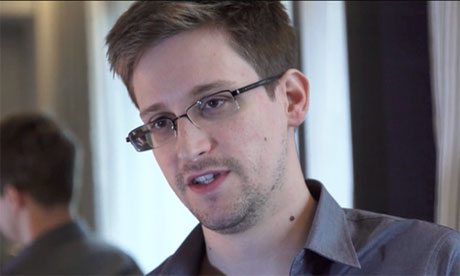
NSA whistleblower Edward Snowden in Hong Kong. Photograph: guardian.co.uk
NSA whistleblower Edward Snowden, in an interview on Saturday and then again Tuesday afternoon, vehemently denied media claims that he gave classified information to the governments of China or Russia. He also denied assertions that one or both governments had succeeded in "draining the contents of his laptops". "I never gave any information to either government, and they never took anything from my laptops," he said.
The extraordinary claim that China had drained the contents of Snowden's laptops first appeared in the New York Times in a June 24 article. The paper published the claim with no evidence and without any attribution to any identified sources.
In lieu of any evidence, the NYT circulated this obviously significant assertion by quoting what it called "two Western intelligence experts" who "worked for major government spy agencies". Those "experts" were not identified. The article then stated that these experts "said they believedthat the Chinese government had managed to drain the contents of the four laptops that Mr. Snowden said he brought to Hong Kong" (emphasis added).
So that's how this "China-drained-his-laptops" claim was created: by the New York Times citing two anonymous sources saying they "believed" this happened. From there, it predictably spread everywhere as truth.
Shortly thereafter, the New Yorker – under the headline "Why China Let Snowden Go" - told its readers: "His usefulness was almost exhausted. Intelligence experts cited by the Times believed that the Chinese government 'had managed to drain the contents of the four laptops that Mr. Snowden said he brought to Hong Kong, and that he said were with him during his stay at a Hong Kong hotel.'" It was then repeatedly cited to demonize Snowden in venues such as DC gossip sheets, right-wing outlets, and diaries at Democratic Party sites.
But there was never any evidence that this was true. The NYT decided to publish this incendiary claim in a news article based purely on rank speculation from two anonymous sources. Obviously, Snowden's denial is not dispositive and shouldn't be treated as such. But it is the only actual evidence on this question thus far.
Americans, to a remarkable extent, seem able and willing to disregard these demonization campaigns. A new Quinnipiac poll released today show that Americans, by a large margin, have positive views of Snowden's actions despite all the demonization: "Fifty-five percent (55%) said Snowden was a whistle-blower in leaking details about top-secret US programs that collect telephone and Internet data . . . . thirty-four percent said he's a traitor." And: "the view of Snowden as a whistle-blower rather than traitor predominated among almost every group of respondents broken down by party, gender, income, education and age."
Moreover, "the poll also showed that by 45 percent to 40 percent, respondents said the government goes too far in restricting civil liberties as part of the war on terrorism. That was a reversal from January 2010, when in a similar survey 63 percent said anti-terrorism activities didn't go far enough to protect the US from attacks, compared with 25 percent who disagreed."
The polling firm's analyst, Peter Brown, provided some fascinating insight about these findings:
"The massive swing in public opinion about civil liberties and governmental anti-terrorism efforts, and the public view that Edward Snowden is more whistle-blower than traitor, are the public reaction and apparent shock at the extent to which the government has gone in trying to prevent future terrorist incidents . . . .The verdict that Snowden is not a traitor goes against almost the unified view of the nation's political establishment "
As usual, the US government, its establishment press, and both political parties have been almost completely united in its views and objectives in this episode. The American people, however, seem to have reached a much different conclusion than the one prepared for and fed to them.
Latin America fallout
As some US journalists assert that no new NSA stories have been published for some time, the controversy over the US spying apparatus in the actual world continues to intensify. Following the anger in Europe,revelations of NSA spying on millions of Brazilians have dominated the news cycle and political class of that country for days now, with formal criminal and Congressional investigations already under way.
Meanwhile, along with O Globo journalists Roberto Kaz and Jose Casado, I published another article in that newspaper on Mondaydetailing that the NSA's bulk collection of millions of emails and telephone calls extends to most of Latin America. The reaction throughout that continent is the same as we've seen in Europe and Brazil specifically: see this Reuters article entitled "Latin American nations fuming over NSA spying allegations" for the details.
I realize that some US journalists see the world as beginning and ending with American borders, but – as these events demonstrate – we have actually been continuing to publish extremely significant NSA stories that are prompting all sorts of debate, investigation and reform around the world.

No comments:
Post a Comment
Comments always welcome!